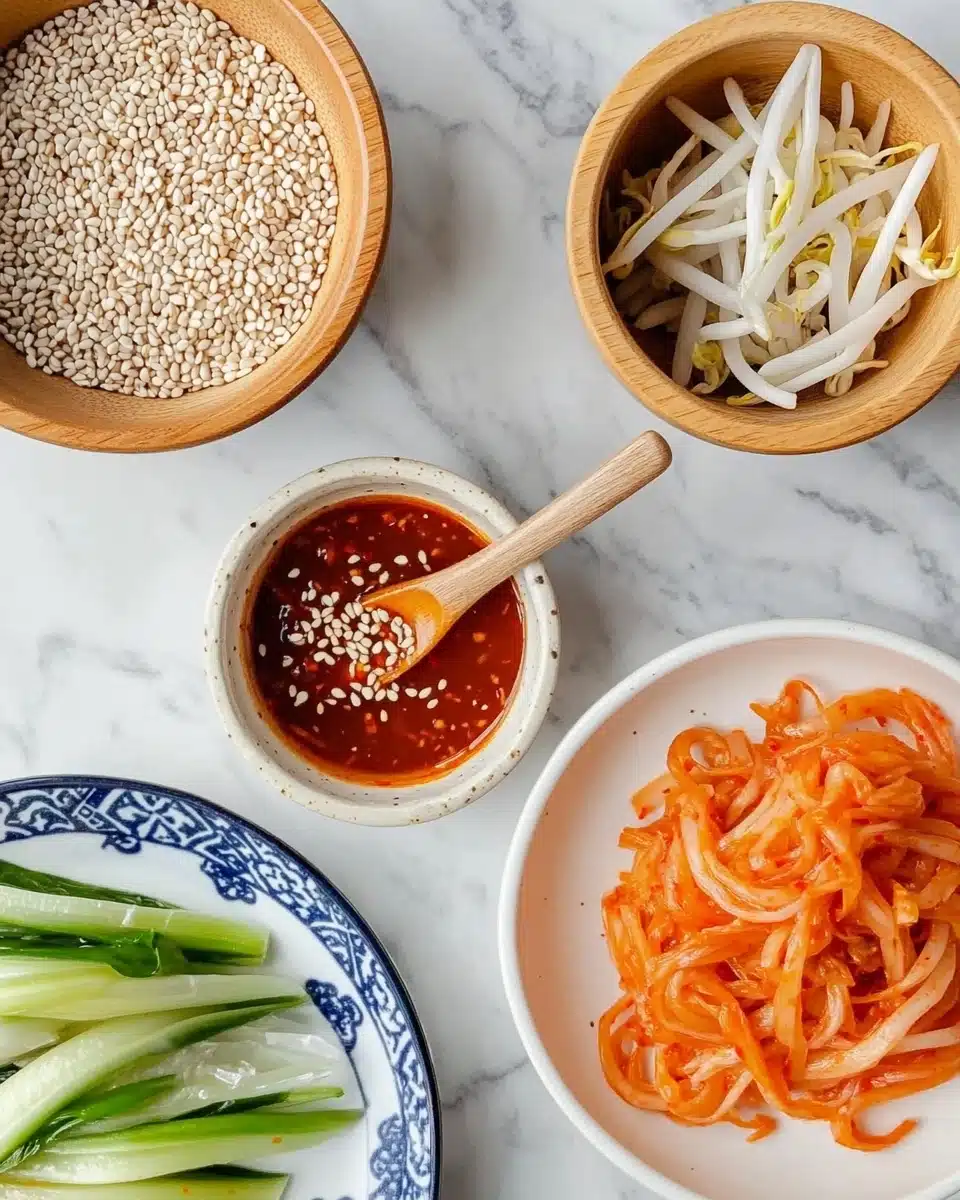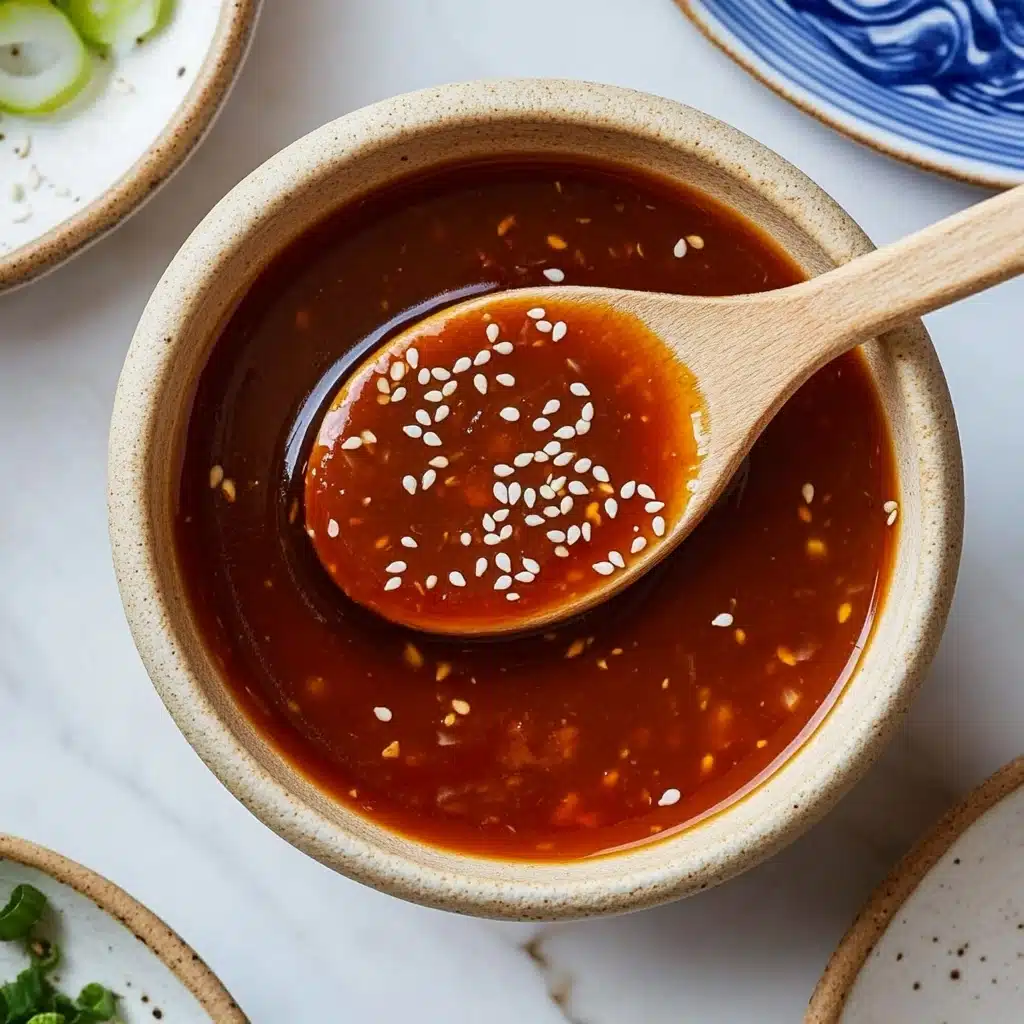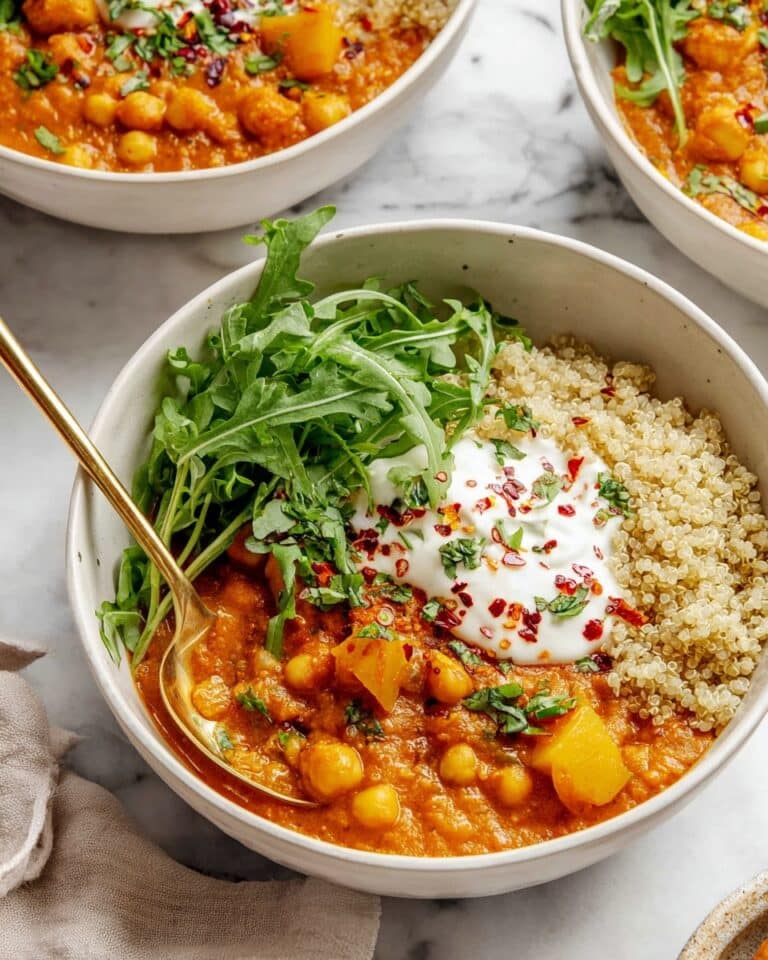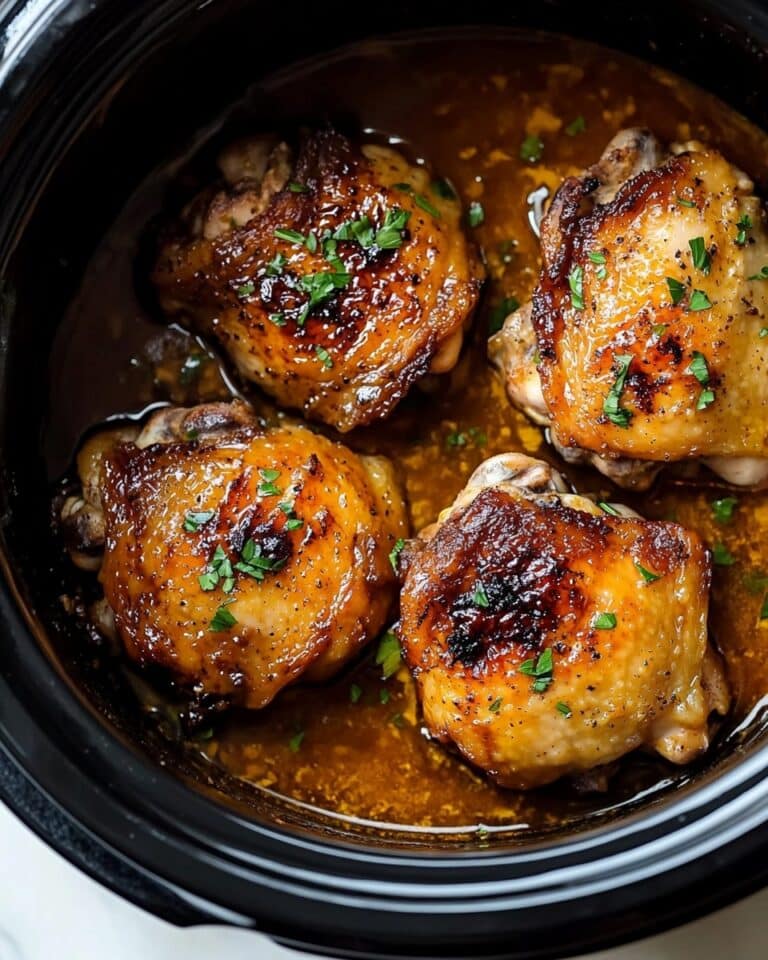If you adore bold, savory heat with a whisper of sweetness, this quick and easy Gochujang Sauce is about to become your new obsession. It’s savory, spicy, tangy, and just a little bit sweet—the perfect drizzle over rice bowls, roasted veggies, or anything that could use a fiery Korean kick!
Why You’ll Love This Recipe
- Big Flavor, Minimal Effort: Just a few pantry staples and five minutes give you restaurant-worthy Gochujang Sauce at home.
- Customizable Heat: Make it mild or extra spicy—every batch is truly yours.
- Versatile Drizzle: Use it to transform bowls, marinades, sandwiches, and more in seconds.
- Addictively Balanced: The dance of spicy, tangy, toasty, and sweet will have you coming back for spoonful after spoonful.
Ingredients You’ll Need
You won’t believe how much flavor comes from just four simple ingredients! Each one is essential, creating a sauce that hits all the right notes of savory, spicy, tangy, and nutty-sweet.
- Gochujang Paste: The star of the show! This fermented Korean chili paste brings deep, complex spice as well as a rich umami punch. Adjust the amount for more or less heat.
- Rice Vinegar: This adds bright acidity that balances the richness of the gochujang and enhances the sauce’s flavor.
- Sesame Oil: Just a splash gives your sauce irresistible nuttiness and a glossy finish.
- Maple Syrup: The subtle sweetness mellows the heat and rounds out all the other flavors for perfect balance.
Variations
Don’t be afraid to make this Gochujang Sauce your own! It’s the perfect starter recipe—easy to tweak whether you’re avoiding certain ingredients or chasing a new flavor adventure.
- Soy-Free Option: Swap the gochujang for a gluten-free variety and double-check your rice vinegar’s label if you’re sensitive!
- Make It Vegan: Most gochujang brands are already vegan, but always check just in case. Maple syrup keeps everything plant-based and delicious.
- Add Garlic: Stir in a minced clove for an extra kick of savoriness (trust me, it’s irresistible!).
- Sweeter Heat: Try honey or agave in place of maple syrup for slightly different undertones.
How to Make Gochujang Sauce
Step 1: Measure and Prep Your Ingredients
Gather and measure out your gochujang paste, rice vinegar, sesame oil, and maple syrup. A little mise en place makes mixing quick and easy, and it lets you tweak the spiciness or sweetness to your exact liking.
Step 2: Whisk Everything Together
In a small bowl, add the gochujang, vinegar, sesame oil, and maple syrup. Whisk vigorously until the sauce is silky, glossy, and everything is thoroughly combined. Taste and adjust—add more vinegar for extra tang, or a bit more maple syrup if you love things a touch sweeter.
Step 3: Use and Enjoy Immediately
There’s no need to wait—your homemade Gochujang Sauce is ready to spoon over bibimbap bowls, swirl into salads, or set out as an addictive dipping sauce for just about anything. How easy is that?
Pro Tips for Making Gochujang Sauce
- Choose Your Gochujang Wisely: Flavor and spice can vary brand-to-brand; start mild and adjust upward to find your perfect heat level.
- Emulsify for Silkiness: Whisk for a full minute to ensure the sesame oil and maple syrup blend smoothly for a creamy, cohesive sauce.
- Prep in Advance: Make the sauce up to a week ahead—letting it rest in the fridge actually deepens its flavor.
- Adjust the Acidity: Want it punchier? A splash of extra rice vinegar brings out the tang and keeps your Gochujang Sauce balanced.
How to Serve Gochujang Sauce
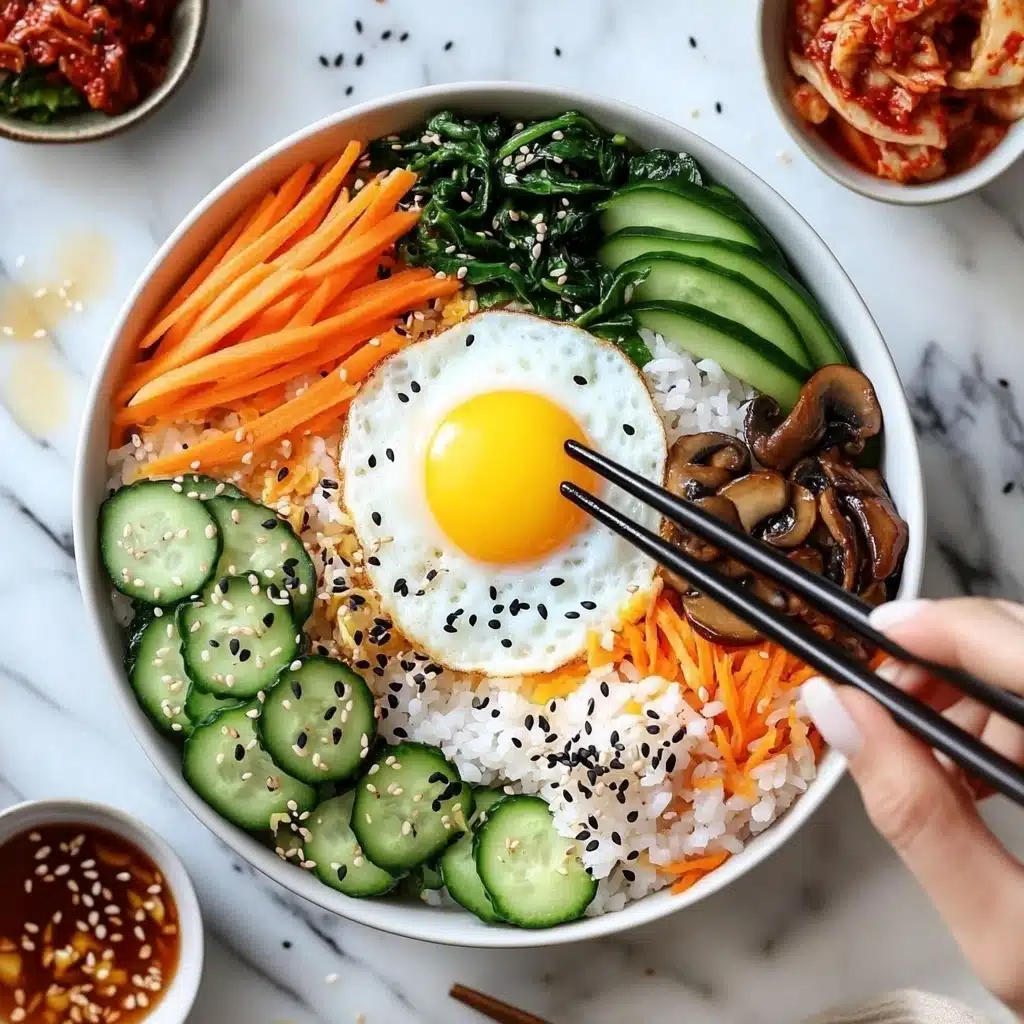
Garnishes
For a pop of color and crunch, sprinkle sesame seeds or sliced scallions over your dish after drizzling on Gochujang Sauce. A sprinkle of toasted seaweed or a few microgreens can also add that special, chef-y finish.
Side Dishes
Pair your sauce-slathered main with simple steamed rice, sautéed greens, or even crispy tofu. It’s also fantastic alongside cucumber salad, pickled daikon, or classic Korean banchan to cool the spice a bit.
Creative Ways to Present
Try serving your Gochujang Sauce in a tiny dipping bowl with veggie crudités, or as a zippy drizzle zig-zagged across a platter of roasted sweet potatoes. It even looks stunning in little mason jars—ready to gift (or keep all to yourself)!
Make Ahead and Storage
Storing Leftovers
Keep any leftover Gochujang Sauce in an airtight container in the fridge. It’ll stay vibrant and fresh for up to a week, ready for whenever excitement strikes at mealtime.
Freezing
To freeze, portion the sauce into ice cube trays for grab-and-go servings. Once frozen solid, pop the cubes into a freezer bag and store for up to two months. Thaw one or two cubes when you’re ready for a flavor boost!
Reheating
Gochujang Sauce tastes best cold or at room temperature, but if you’d like it warmed, briefly microwave or gently heat it on the stove over low. Stir well before serving to re-emulsify the sauce.
FAQs
-
Can I make Gochujang Sauce less spicy?
Absolutely! Use just 2 tablespoons of gochujang paste for a milder sauce, or even a little less and then stir in more to taste. You can also add extra rice vinegar or maple syrup to further tame the heat.
-
What brand of gochujang does this recipe use?
I love Mother-in-Law’s Gochujang for its balanced flavor and moderate spice—it’s available at many Whole Foods stores. However, you can use any good-quality Korean gochujang paste you have on hand!
-
Can I use this as a marinade?
Yes! Gochujang Sauce is fantastic as a marinade for tofu, chicken, or vegetables before grilling or roasting. Just let your protein or veggies soak up the sauce for at least 30 minutes for the best flavor.
-
Is Gochujang Sauce gluten-free?
Some traditional gochujang pastes are not gluten-free due to wheat in the fermentation process. Look for specifically labeled gluten-free gochujang if you have sensitivities, and check your other ingredient labels to be sure.
Final Thoughts
If you’re ready for a no-fuss way to instantly elevate any meal, give this Gochujang Sauce a try. It’s endlessly versatile, outrageously flavorful, and—best of all—comes together in a snap. Let your taste buds take a little trip to Korea tonight!
Print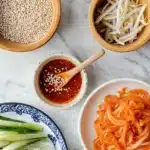
Spicy Gochujang Sauce Recipe
- Prep Time: 5 minutes
- Total Time: 5 minutes
- Yield: 4 servings
- Category: No-Cook
- Method: No-Cook
Description
A quick and easy recipe for homemade Gochujang sauce that’s perfect for adding a flavorful kick to your favorite dishes.
Ingredients
Gochujang Sauce:
- 2 to 3 tablespoons gochujang paste*
- 1 1/2 tablespoons rice vinegar
- 1 tablespoon sesame oil
- 1 tablespoon maple syrup
Instructions
- In a small bowl, whisk together the gochujang paste, vinegar, sesame oil, and maple syrup.
- Spoon onto bibimbap bowls, or use as a dressing for any veggie rice bowl.
Use less gochujang paste for a mild sauce, use more for a spicier sauce.
Notes
- *I use Mother in Law’s Gochujang which I get at Whole Foods. Other brands may vary in flavor and spice level.

